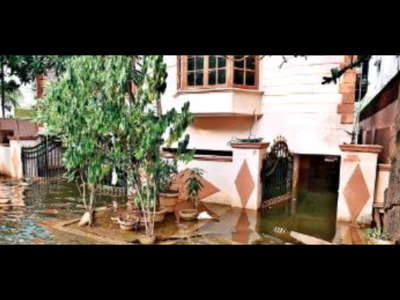The Times of India 28.10.2010
TDR sanction puts 205 cr in civic coffers
MUMBAI: In the last three years, the BMC has earned Rs 205 crore as premium from the sanction of Transfer of Development Rights (TDR). The maximum premium of Rs 46.15 crore was earned in M ward (Mankhurd, Govandi, Trombay, Shivaji Nagar and Chembur) where a majority of slum rehabilitation projects have been implemented.
It is followed by Bandra West where Rs 32 crore has been collected and Andheri West where Rs 20 crore has been earned by the BMC.
The premium is collected against the relaxation of open space and parking lots required for loading TDR on a plot. TDR is floating floor space index given in lieu of surrendering land for development of public amenities like roads, drains, schools, playgrounds and dispensaries. The civic authority had introduced the TDR policy in 1991 in Development Control Regulations. The concept was introduced as the BMC did not have cash to pay for acquisition of land. TDR can be used only to the north of the property and most of it has been used in the suburbs.
In the late 90s, the government also allowed slum TDR, granted for rehabilitation of project-affected persons. This resulted in huge constructions in the western suburbs between Bandra and Dahisar. All this has put a strain on the existing civic infrastructure such as roads and water supply, which have not been upgraded at the same pace as the sanctioning of building construction.
In an affidavit filed in the Supreme Court, the BMC has claimed that the money earned between 2007 and 2010 has been utilized for providing and maintaining parks, playgrounds, traffic islands, trees, gardens, children’s play equipment and other amenities. The affidavit was filed in response to a special leave petition by the NGO Janhit Manch, seeking the squashing of the TDR policy. “Its final hearing is likely to be held the following month,” said Bhagwanji Raiyani, founder of the manch. “I am satisfied with the BMC’s submission. It would have utilized the funds properly,” said Raiyani.
Following a Bombay high court order, the civic authority had constituted a separate revenue budget where money collected as premium from TDR is being put. The ward from where the revenue is collected has the first right on the money for development and maintenance of its open spaces.
“This only shows that the BMC has enough funds to protect its open spaces. It cannot claim that as an excuse to parcel out the city’s spaces. The caretaker policy must be scrapped. Instead, it should set up a monitoring committee to ensure that the funds are properly spent to maintain the spaces,” said Nayan Kathpalia, convener, Citispace-an NGO that has been fighting to save the city’s few open spaces.
It is followed by Bandra West where Rs 32 crore has been collected and Andheri West where Rs 20 crore has been earned by the BMC.
The premium is collected against the relaxation of open space and parking lots required for loading TDR on a plot. TDR is floating floor space index given in lieu of surrendering land for development of public amenities like roads, drains, schools, playgrounds and dispensaries. The civic authority had introduced the TDR policy in 1991 in Development Control Regulations. The concept was introduced as the BMC did not have cash to pay for acquisition of land. TDR can be used only to the north of the property and most of it has been used in the suburbs.
In the late 90s, the government also allowed slum TDR, granted for rehabilitation of project-affected persons. This resulted in huge constructions in the western suburbs between Bandra and Dahisar. All this has put a strain on the existing civic infrastructure such as roads and water supply, which have not been upgraded at the same pace as the sanctioning of building construction.
In an affidavit filed in the Supreme Court, the BMC has claimed that the money earned between 2007 and 2010 has been utilized for providing and maintaining parks, playgrounds, traffic islands, trees, gardens, children’s play equipment and other amenities. The affidavit was filed in response to a special leave petition by the NGO Janhit Manch, seeking the squashing of the TDR policy. “Its final hearing is likely to be held the following month,” said Bhagwanji Raiyani, founder of the manch. “I am satisfied with the BMC’s submission. It would have utilized the funds properly,” said Raiyani.
Following a Bombay high court order, the civic authority had constituted a separate revenue budget where money collected as premium from TDR is being put. The ward from where the revenue is collected has the first right on the money for development and maintenance of its open spaces.
“This only shows that the BMC has enough funds to protect its open spaces. It cannot claim that as an excuse to parcel out the city’s spaces. The caretaker policy must be scrapped. Instead, it should set up a monitoring committee to ensure that the funds are properly spent to maintain the spaces,” said Nayan Kathpalia, convener, Citispace-an NGO that has been fighting to save the city’s few open spaces.


